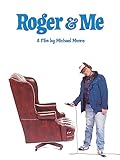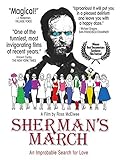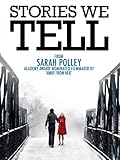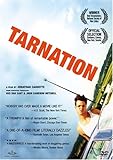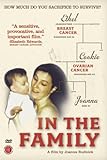Like any film, successful personal documentaries must do a good job answering the question of why does this story deserve to be a film? The films we’ve listed below do this exceptionally well by taking viewers on a spellbinding journey of one kind or another. Although these films are most often “starring” the filmmaker themself, we may or may not actually see them on screen. Sometimes personal documentary films are connected to a broader issue and other times they’re stand-alone gems without any attachment to the outside world.
The best personal documentaries
Roger & Me
In Roger & Me, Michael Moore’s first documentary, he visits his hometown Flint and explores its economic devastation– both in relation to his own family’s history and also in relation to General Motors, which used to employee its citizens before jobs were outsourced to other countries for cheaper labor. Roger & Me is a classic of the personal documentary genre that launched it onto the big screen for perhaps the first time in front of such a wide audience. Moore uses humor and devastating juxtapositions to make his political points while framing it within a personal narrative that makes it relatable to viewers. Today, Moore has become somewhat of a politicized figure but regardless of your opinions of him, this 1989 documentary stands as a pillar of the genre of personal docs. Rotten Tomatoes, which aggregates critics’ reviews, gives the film a 100% fresh rating with reviews from 30 critics. Roger & Me is a must watch personal documentary.
Camera Person
Kirsten Johnson has served as a camera operator for over 50 documentary films. In her lyrical autobiographical documentary Camear Person, she stitches together outtakes that never made it into the films she shot into her own film that takes the viewer on the journey of her career around the world. With footage from 25 years, she’s crafted a fascinating swimming pool to dive into full of footage from all over the world artfully arranged.
Sherman’s March
Sherman’s March has to be one of the strangest films of all time. Documentary filmmaker Ross McElwee set out to make a film about the legacy of Civil War general William Tecumseh Sherman’s march through the South culminating in a confederate surrender. But, just as he started to film, his girlfriend broke up with him, and he decided to switch course and took his film funding and used it to make a film exploring why no woman wanted to stay with him. The film ends up incorporating US history as well as his own personal history in an odd but funny and sometimes surreal amalgam. The film won the Grand Jury prize for documentary at Sundance Film Festival and earned its spot in the annals of personal documentary film history.
Stories We Tell
Stories We Tell is an extraordinary personal documentary by filmmaker Sarah Polley. It explores the story of the filmmaker’s family and whether or not she was the product of an extramarital affair that her mother had with a movie producer. The film is told in a fascinating way with re-created home movie footage shot with actors and an old Super-8 film camera. It has been voted one of the top ten Canadian films of all time, both fiction and non-fiction.
Tarnation
Tarnation is a film that is sometimes shown to documentary film students to prove that you don’t need expensive professional documentary film gear to make a great film. With 20 years of amateur home video footage that the filmmaker Jonathan Caouette had shot since he was eleven years old, the footage was edited on Apple’s free iMovie platform and ending up getting shown at the prestigious Sundance and Cannes Film Festivals. It covers his mother’s struggle with mental illness and is edited in a distinctive style. It has been considered one of the most moving personal documentaries of all time, as well as a landmark film about mental illness.
In The Family
In The Family is a personal documentary that starts when a filmmaker realizes she has a very high statistical probability of getting breat or ovarian cancer or both at a young age. The film deals with her struggles to decide what to do– remove her breasts possibly? Genetic patenting also becomes relevant in the documentary too. This doc was broadcast on PBS as part of their POV strand of documentaries with a personal point of view.
Why do we like personal documentaries? Personal documentary films are often less grand in scope than capital D documentaries but they are often more intimate too, which makes them appealing and particularly relatable. In order for a subject to “justify” a film it needs to be extraordinary and the personal documentary films with the widest appeal do that.
Related:
3 Spellbinding Mystery Documentaries
List: Top Books About Documentary Filmmaking
10 Funny Documentaries – the Funniest Documentaries of All Time

